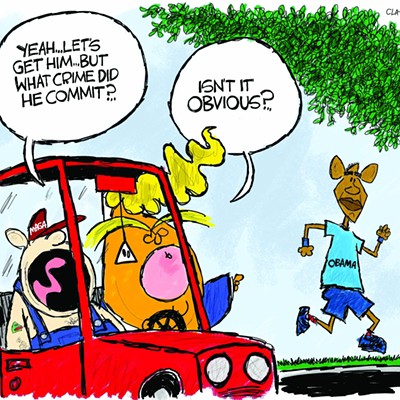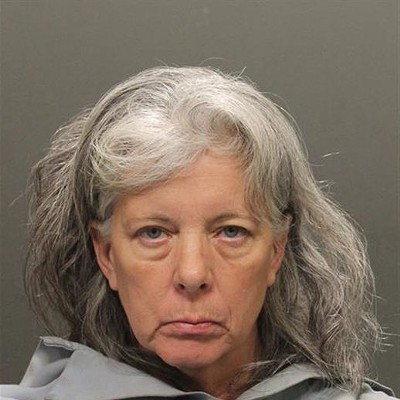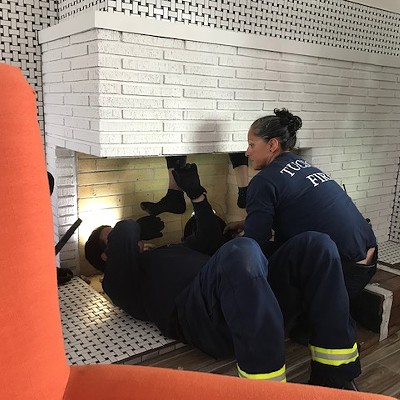Days later, hundreds gathered for a candlelight vigil for the 21-year-old near the spot where he was found. The prevalent feeling among many people was that Mark Fontes was attacked for one reason: He's gay.
Fontes' beating sent shockwaves through the local gay, lesbian, bisexual and transgender community, bringing new urgency to calls for change.
"What happened a few nights ago was a horrible, horrible tragedy," Nancy Robinett, co-chair of the City of Tucson Commission on GLBT Issues, told the crowd at the vigil on Thursday, Jan. 15. "(It was) a tragic, horrible example of the fact not all of us are equally safe, and we need to work on it."
Investigators are looking into all possibilities and are unwilling to call what happened to Fontes a hate crime--or even an attack--until they can "narrow down the motive for the incident," said Sgt. Marco Borboa, a Tucson Police Department spokesman.
"History tells us that a lot of people frequent that area, especially at that time," he said. "We're hoping that people come forward with additional information."
Some speculation has also focused on the fact that Fontes was involved in a prank at Davis-Monthan Air Force Base last year, during a visit by President George W. Bush.
What authorities do know is that Fontes left the gay bar IBT's, 616 N. Fourth Ave., before closing on Monday, Jan. 12--possibly with another person. At around 12:45 a.m. Tuesday, a man found Fontes face-down in a pool of blood.
According to Fontes' mother, Barbara Fautrelle, his injuries were so severe that doctors said it was extremely likely he would die. Fautrelle looked tired and spoke in disjointed sentences at the vigil. She said she hadn't slept in days.
"I know Mark wants me to be here," Fautrelle said, as she waded through the crowd. "I told him, 'Mark, Mom's going to do something for you.' I want him to open his eyes and say, 'Ma, I want chicken wings.'"
Fontes' condition has stabilized since then, but he remains heavily sedated and has only been able to squeeze hands and open his eyes for minutes at a time, said his brother, Daniel Fontes.
Several people at the vigil said they could recall other incidents in the past few years where gay men were victimized, including the stabbing of a gay man on Fourth Avenue in 2000.
Jonna Lopez, director of the University of Arizona's Pride Alliance, says there's cause for concern.
"I thought it was beautiful to see this many people," said Lopez, just after the vigil ended. "But I looked around and started worrying about every gay man there. It sent kind of a ripple through the Pride Alliance and the community in general."
A 2003 report, released by the City of Tucson Commission on GLBT Issues, found an undercurrent of abuse in the city. Of those surveyed, 74 percent of gay males and 55 percent of lesbians 19 or younger said they had experienced verbal harassment or threats. Comparatively, only 34 percent of straight youth reported similar abuse.
"You are at a particularly high risk of violence if you are young, if you are male, and you're gay," Robinett said during a phone call. "That's a really disturbing statistic. When you live in an atmosphere where there's a lot of name-calling, threats and low-level violence, it makes it that much easier for high-level violence."
In addition, 40 percent of the GLBT youth surveyed said verbal abuse or harassment happened at school. According to Robinett, Americans need to "grow out of a place where it's acceptable" to harass people at school because of who they are.
"Schools are just horribly anti-gay places," she said, citing the example of the word "gay" being used as a casual epithet. "Schools don't perceive it as a problem."
Andrew Greenhill, Mayor Bob Walkup's chief of staff, said the city is "at the forefront" of embracing GLBT issues, even if that progress is sometimes overshadowed by violence. He cited the amendment of a local anti-discrimination ordinance to include "sexual orientation," as well as the domestic partner registry that recently came into effect as evidence.
"Tucson is of the upper echelon of cities that have, both in law and practice, embraced GLBT issues," Greenhill said. "The mayor has taken a stand on these issues."
Still, there are no plans to proactively target hate crimes against the GLBT community at this time, Greenhill said.
Robinett agreed Tucson is generally one of the more GLBT-tolerant cities in the nation. But that doesn't mean there's not room for improvement, she said.
According to Robinett, everyone can work on making the social climate in our society more favorable to gay males in particular, and police could receive more sensitivity training and policing in certain areas.
It's hard to say for certain how Tucson compares to other cities in the number of hate-motivated crimes, said Kent Burbank, executive director of Wingspan, a GLBT community center. But Burbank claimed that what happened in Tucson could happen anywhere in America.
He credited the mayor, the city council and the board of supervisors with being "very supportive" of the GLBT community, but said more attention needs to be given to hate crimes--not just in Tucson, but everywhere.
"It scares people in the GLBT community, and I think it sends the message to the few hate mongers that it's OK to attack people," he said over the phone. "I think it's a significant problem that we're just beginning to see. This type of violence isn't what we stand for in this community."
Back at the vigil, the community's support was a comfort to Fontes' family. Strains of "We Shall Overcome" gave way to "I Will Survive," reinforcing Fautrelle's resolve to accept her son for what he is.
"My son--his sexual preference is nothing to me," Fautrelle said. "I have a gay son. He's a good kid."












